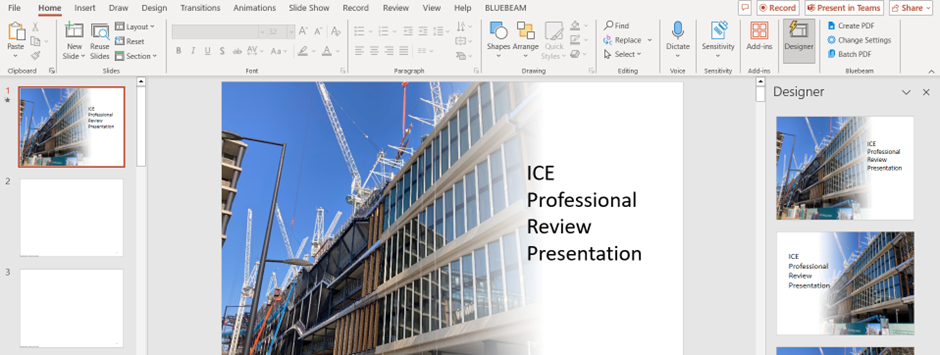Introduction to 'Guidance on the ICE Professional Review (Presentation, Interview, and Communication Task)'
The Institution of Civil Engineers (ICE) Professional Review is a significant milestone, determining your readiness for professional practice. The review process includes three critical components: the presentation, the interview, and the communication task. This guide provides detailed guidance on the ICE Professional Review to help you excel in each of these areas.
1. The Presentation
Purpose and Structure: The presentation is the first part of the review and serves as an opportunity for you to showcase your experience and evidence of the attributes. It typically lasts 15 minutes and should focus on a key project that is relevant to your Professional Review Report.
Preparation:
Choose a Relevant Project: Select 1 or 2 significant projects or subjects that showcase your skills and experiences effectively. Very importantly, ensure it aligns with the attributes required by the ICE.
Organise Your Content: Structure your presentation with a clear introduction, main body, and conclusion. Highlight your role and responsibilities, your position within the company and project that you are showcasing, the challenges faced and the solutions that you were involved in developing and implementing, and the outcomes.
Visual Aids: Utilise slides to support your presentation. Visual aids should be clear, concise, and relevant. Avoid cluttering slides with too much text; instead, use bullet points, images, and diagrams to illustrate your points. In face-to-face meetings, you could print the slides and place them in a flip chart for A4 / A3 size paper, but in virtual reviews you are likely to share your screen of the presentation.
Rehearsal: Practice your presentation multiple times to ensure you can deliver it within the allotted time. Rehearsing in front of colleagues or mentors can provide valuable feedback. You could try writing a script or general notes for your presentation, as you rehearse the presentation you can time how long it takes then refine it to keep it within the time limit.
Delivery:
Clarity and Confidence: Speak clearly and confidently. Maintain eye contact with the reviewers and avoid reading directly from your notes. Rehearsing this with colleagues or your mentor, even possibly friends & family, will help you gain confidence in presenting.
Engagement: Keep you reviewers engaged and interested by highlighting key aspects of your project. Part of the review is to assess your communication skills and delivering a presentation that can keep an audience engaged is important. Keep it engaging but maintain a professional presentation.
Handling Questions: Be prepared to answer questions at the end of your presentation. This demonstrates your thorough understanding and ability to think on your feet. Prior to the review try thinking about potential questions the reviewers might ask. You could ask a colleague or mentor to have a look through, provide feedback, and think of potential questions.
2. The Interview
Objective: The interview assesses your competence across all required attributes. It follows immediately after the presentation and lasts about 60 minutes for the IPR and 75 minutes for the CPR. During the interview you will be asked questions about your experience and report by the reviewers. These will be chartered civil engineers with a wealth of knowledge and experience who will have gone through your report and prepared questions. The purpose of the reviewer’s questions is to fully understand the depth of your knowledge in each of the attributes.
Preparation:
Understand the Attributes: Familiarise yourself with the ICE’s attributes for the grade you are applying for. These include understanding and practical application of engineering, management and leadership, commercial ability, health, safety, and welfare, sustainable development, interpersonal skills and communication, and professional commitment. We provide detailed guidance on the attributes as found here: https://www.engineeringworkspace.com/post/guidance-on-the-ice-attributes
Review Your Report: Be thoroughly acquainted with the details of your Professional Review Report and the appendices. You should be able to discuss any part of your report confidently. Think about any areas you feel is lacking from your report, for example if your experience is mostly in commercial and the report is lacking in technical experience then firstly try addressing this before submitting or, if already submitted, think of potential questions and be prepared to answer them; likewise if you have technical experience and lack commercial evidence in your report.
Current Affairs: Stay updated on current trends and issues in the civil engineering field, as you may be asked about recent developments or industry challenges. One example of this is being asked about the current ICE president are their goals for during their time as president.
Study: Study everything you can in the lead up to the review. Define a list of areas you want to focus on and study them so that you are as prepared as possible for just about any question the reviewers ask you. We have several courses that help you go through each of the key areas and fill in any potential knowledge gaps in preparation for the review. Check them out here: https://www.engineeringworkspace.com/courses
Mock Interviews: Conduct mock interviews with mentors or colleagues to simulate the review environment. This helps in refining your responses and managing interview anxiety.
During the Interview:
Professional: Dress professionally and maintain a formal demeanour throughout the interview.
Structured Responses: Answer questions in a structured manner. Use the STAR (Situation, Task, Action, Result) method to provide clear and comprehensive responses. Let’s say, for example, you were involved in a piece of design work, start by explaining why the design was required, e.g. the client’s brief, then explain what task was required and focus on your involvement during the action of the task, finally explain the result of this design, i.e. did it work well? Were they any problems? What would you do differently in the future?
Honesty: Be honest about your experiences and competencies. If you do not know the answer to a question, it is better to acknowledge it rather than attempt to fabricate a response, otherwise the reviewers will dig deeper and ask more questions to find out if you actually know what you’re talking about. If the reviewer’s question is very specific about a topic you do not know, then be honest but take this as an opportunity to talk about something that you do know a lot about. For example, if they ask you something very specific about NEC contracts that you don’t know the answer to because your experience is with JCT contracts, then be honest and explain that you don’t know the answer to that specific question because your experience is within JCT contracts but highlight the areas of NEC contracts that you do know about, this means you have been honest and providing the reviewers an understanding of what you do know.
Clarification: Do not hesitate to ask for clarification if a question is unclear. This shows attentiveness and a desire to provide accurate information.
3. The Communication Task
Purpose: The communication task evaluates your ability to clearly and effectively convey technical information in writing. IPR candidates are given 60 minutes, while CPR candidates have 90 minutes to complete this task. Its purpose is to ensure that you can explain engineering ideas and topics in a clear and understandable manner. IPR candidates are given two question to answer one with a response as a technical memo or technical note etc. CPR candidate will be given a choice between two options, each with its own format (e.g. blog, report etc) and scenario (e.g. decarbonisation in construction) in which you answer one with a response that should demonstrate toy ability to understand the information and present them clearly.
Preparation:
Practice Writing: Regularly practice writing technical reports, letters, and other documents. Focus on clarity, conciseness, and relevance.
Understand the Format: Familiarise yourself with the typical formats and styles expected for various types of written communication. This could include technical reports, client briefs, or public consultation documents.
Time Management: Develop the ability to organise your thoughts and write coherently within a limited timeframe. Time yourself during practice sessions to build this skill.
Review examples: Find examples of communication tasks done by other candidates. Try asking your mentor if they can provide you with their communication task examples that they completed in preparation for the review. We currently have an example of a completed communication task that you can find here: https://www.engineeringworkspace.com/post/ice-communication-task-example
During the Task:
Analyse the options: Carefully read and understand the options before starting. Identify the key points you need to address before choosing which format and scenario you want answer to complete the communication task.
Structured Writing: Structure your response with a clear introduction, body, and conclusion. Use headings and subheadings to organise your content logically.
Clarity and Precision: Write clearly and precisely. If the format states that it is to non-technical readers then it would be wise to avoid unnecessary jargon and ensure your explanations are easily understandable.
Proofreading: Allocate a few minutes at the end to review and proofread your work. Check for grammatical errors, clarity, and completeness.
Conclusion
The ICE Professional Review is a comprehensive assessment of your readiness for professional practice in civil engineering. By thoroughly preparing for the presentation, interview, and communication task, you can confidently demonstrate your competence and commitment to the profession. This guide provides a roadmap for success, emphasising the importance of structured preparation, clear communication, and professional demeanour. With dedication and strategic preparation, you can navigate the review process effectively and achieve your professional goals. We will finish off by these final few tips for success:
Time Management: Effective time management is crucial for the entire review process. Ensure you allocate sufficient time for each component and adhere to deadlines. This includes time management in the lead up to the review process, such as finishing the presentation and rehearsing it, studying for the interview, and going through past communication tasks; and also includes time management during the review, such as finishing the presentation and communication task within their respective time limits.
Seek Feedback: Regularly seek feedback from mentors, colleagues, and other professionals. Constructive criticism can help identify areas for improvement and enhance your performance.
Continuous Learning: Engage in continuous professional development and learning. Attend seminars, workshops, and training sessions to stay up to date with industry developments and enhance your competencies.
Mental and Physical Well-being: Maintaining a balanced lifestyle is essential. Ensure you get adequate rest, nutrition, and exercise to keep your mind and body in optimal condition for the review.




Comments